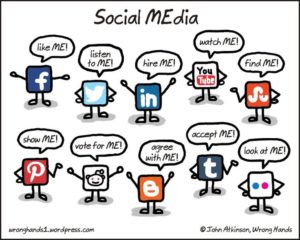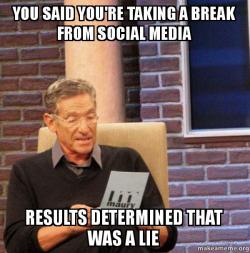It is late at night, my family is asleep, and I am finally free to do as I please. So what do I do? At the first chance I get, I log onto Facebook and Instagram to mindlessly sift through endless news feeds and update the statuses on my personal and business pages. Usually, I am ready to go to bed early but my scrolling and updating cause me to remain awake through an unnecessary amount of hours. I am frustrated. Madness! Why do I let social media consume what precious little time I have. I used to read books, clean, call friends and family, go outside…sleep!
Instead, I chose to be on Facebook watching the latest on-trend shared videos and lifestyle milestones among friends. I share the videos and congratulate the friends. But, wouldn’t my friend appreciate it more if I called them? Why (as in the amount of time to send an impersonal post) don’t I call them? Sure, it is more comfortable, but what about the connectivity? What happened to the times where we visited a friend’s home over visiting a friend’s page? Not long ago, social media giants praised their efforts in “connecting the world.”
However, should we consider the possibility that in trying to connect the world digitally is actually severing ties? Not only with each other, but with ourselves. Undoubtedly, social media is an impactful and essential tool for retail conglomerates to boost their brands among the masses. But, how much longer will we continue to allow these brands to infiltrate our private lives? Sometimes, even against our own will as we unwilling and unknowingly are tagged by friends…or friends of friends, maybe distant relatives?
Christina Farr (2018) wrote an article regarding her journey of the through her personal experience (and goals) of detaching and, as she described, “social media detoxing.” Per Farr, her reference of a former Google tech suggesting “social media is hijacking our minds.” I find this all to be true and accurate. Again, madness! We have to reprogram our brains to adapt to living without social media.
Farr wrote of the first several weeks (with the help of a “grounding camp”) spent conditioning her mind to refrain from using select social media outlets; i.e. Facebook and Instagram. For instance, at times she would find herself typing “F” for Facebook (Farr, 2018). Or, searching your iPhone app only to realize the Instagram app is included. Farr mentions she was not too keen on Snapchat. But, she kept LinkedIn and Twitter for work purposes; again, unwillingly. Otherwise, she would remove connections to those apps as well. On the upside, since Farr took her break and overcame her barriers, she said she’s lived a more blissful life and claims she will never go back.
Farr mentioned numbers of users breaking from social media have substantially threatened social media giants (Farr, 2018). Especially regarding Facebooks’ recent political debacle resulting in the #deleteFacebook campaign (Farr, 2018). However, suppose we all decided to forego social media? Members of Gen Y (or Gen C) will be unfamiliar with life without social media as this is the group most conditioned and exposed. As such, Farr explained that her profound new attitude–like potentially many new others that overcome their addition–disrupts the flow of major social media companies.
But, ultimately, when one is spending at least 5 hours a week on social media, they should consider how their time is spent (Farr, 2018). So the challenge for social media companies is competing against the time users can gain back from their utilization of social media. Their time is priceless and more valuable than any new status update or cute post of heart hands can give.
As such, I am confident (more so, would not be surprised) this generation group would fall as the greatest victims of a social media withdrawal. What would that look like? But, I often wonder this because as a millennial mother, I’ve grown through a time when social media was emerging but virtually unheard of. Alternatively, at what point of the “social media detox program” is for marketers of the social media companies and their affiliates going to kick it into high gear to retain their users?
Reference
Farr, C. (2018 December 1). I quit Instagram and Facebook and it made me a lot happier–and that’s a big problem for social media companies. CNBC. Retrieved from https://www.cnbc.com/2018/12/01/social-media-detox-christina-farr-quits-instagram-facebook.html




12 Responses to Could we ever go back to a world without social media?